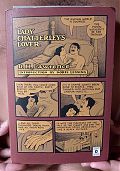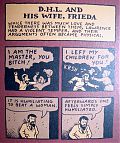
DH Lawrence
Lady Chatterley's Lover
Thinking about Lady Chatterley’s Lover is like opening a great sluice of ideas. There is so much I would like to say about this book, as it has been since I first read it. And as I have in The Body’s Long Madness. If there was a single philosophy I could follow it would be DH Lawrence’s set forth here and I would follow it like a dog, till the end. Unfortunately (or fortunately) I appreciate idealistic diffusion, which leaves me with a mouthful of praise and reverence.
Reading a couple blog reviews and their subsequent comments online, it seems there is an almost consensus of dislike for the characters Lady Chatterley and her lover. And that doesn’t surprise me. They are not exactly likable people for they have absolutely no affection for society. On a blog I even read that there is too much lecturing in Lady Chatterley’s Lover. (Yes, there is quite a bit.) But it seems that we have become completely habituated to what DH Lawrence voiced his criticisms against so that disrespect for our pillars of society—money, success, “dirty” sex and power—is seen as not being necessary at all!
Simplicity has ceased to exist. The nearness and the connections that DH Lawrence wrote about have been so thoroughly trampled that we no longer notice them underfoot. The age of industrialism has not passed; we have absorbed it.
Connie Chatterley, her husband Sir Clifford and her lover Oliver Mellors witnessed World War I, the men fighting in it. They were all broken by the horrors and Sir Clifford more so, he lost his legs after a month on the battlefield and was sent home. The wounds incurred at war are to Doris Lessing (according to her introduction), the central theme of Lady Chatterley’s Lover, though most find it to be that which saves them, Connie and her gamekeeper’s tenderhearted fucking. Sex doesn’t save the lovers from only the wounds of war but also from the doomed human world.
Because when I feel the human world is doomed, has doomed itself by its own mingy beastliness—then I feel the colonies aren’t far enough. The moon wouldn’t be far enough, because even there you could look back and see the earth, dirty, beastly, unsavory among all the stars: made foul by men.
To contrast with:
How beautiful he felt, how pure in tissue! How lovely, how lovely, how strong, and yet pure and delicate, such stillness of the sensitive body! Such utter stillness of potency and delicate flesh! How beautiful, how beautiful.
Lawrence intended to free up the language of sex by refusing to “do dirt on sex.” Sex was tenderness to Lawrence, and regeneration. There is the classical scene of Lady Chatterley running naked through the rain followed by Mellors adorning their naked bodies with flowers. There is sex and plenty descriptions of the phallos; there is our relationship to our bodies when we are mentally true to them; and when we are not, characterized by Sir Clifford who never admits to miss what he is missing.
Something I didn’t notice the first time I read Lady Chatterley’s Lover was the attraction and repulsion that make up so much of Connie and Mellor’s relationship. At first Connie is struck by the perfect, white solitary nudity of a creature who lives alone and the next time she suddenly flushes with anger and they argue. But even when they have gone to bed together they go back and forth between these feelings in single evenings. One must believe this was the passionate relationship for DH Lawrence, as equally passionate with attraction and repulsion. What little I know about his life with Frieda is that they often argued, and forcefully.
Therefore, again she was divided between two feelings: resentment against him, and a desire to make it up with him.
But it is perhaps the passion behind the text of Lady Chatterley’s Lover that I love best. It is a feverish book, as feverish as Lawrence was with tuberculosis, his own impotence and the subsequent affairs of Frieda. Like the passions of Connie and Mellors, the themes rock between the brokenness of people brought on by war and lesser, society, and our human abilities to survive on account of our inextinguishable tenderness. To wager the survival of our species by the tenderhearted fuck, doesn’t seem that far off to me.
She was like a forest, like the dark interlacing of the oakwood, humming inaudibly with myriad unfolding buds. Meanwhile the birds of desire were asleep in the vast interlaced intricacy of her body.
Side Note: I read the Penguin Classics, Deluxe Edition of Lady Chatterley’s Lover, which is superb. It includes the A Propos, notes, maps, glossary of dialect, an introduction by Doris Lessing and more than amusing comics on every flap and cover.
· · · · · · · · · · · · · · · · · · · ·
